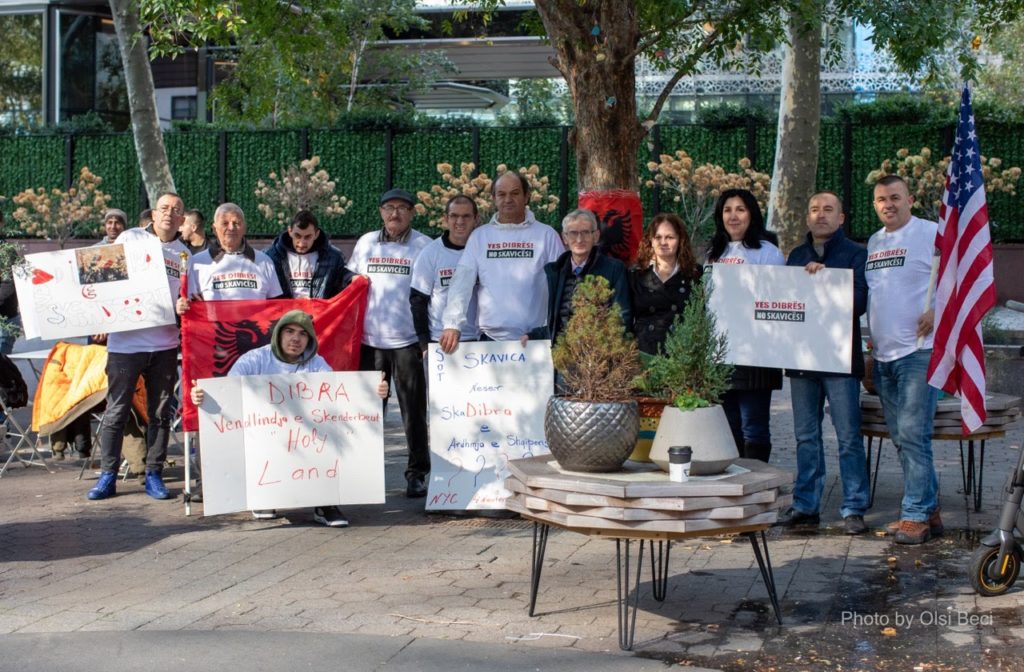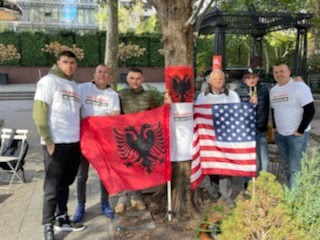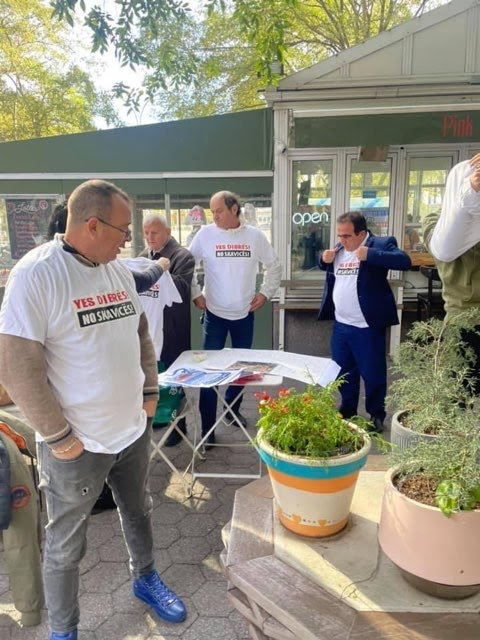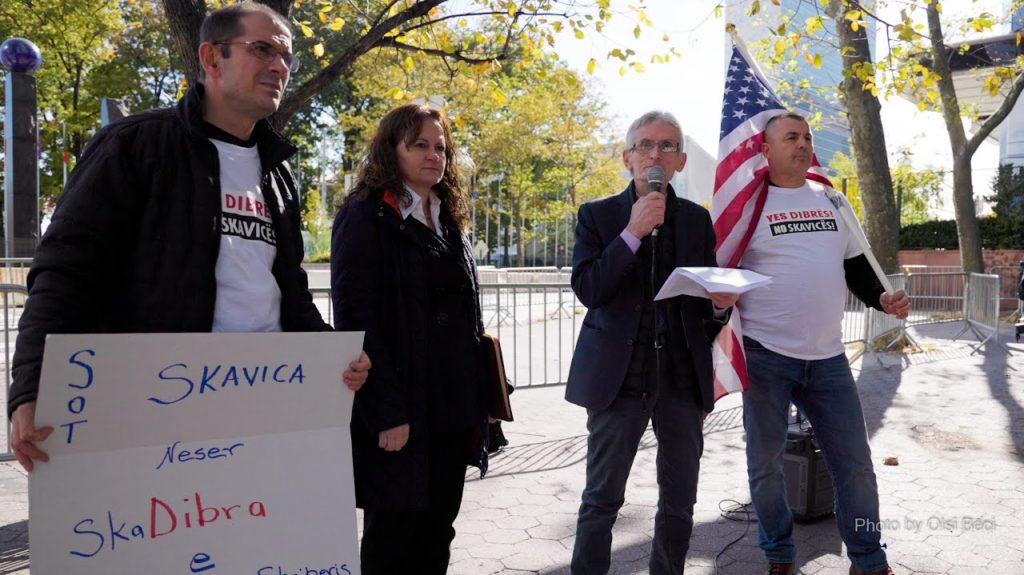



The Power of Protesting
by Rafaela Prifti/
Following the protest held by Albanian American community leaders and activists to denounce the Skavica project last Friday, Dielli caught up with a number of participants and organizers to get their perspectives. Wearing the message of the rally on T-shirts and holding banners, each of them addressed the crowd gathered at the plaza across from the UN Headquarters in midtown New York. All of them have taken a stand against the Hydro Power Project set to be located upstream of the Drin river that will displace local communities, threaten their livelihood, condemn dozens of villages, disrupt the habitat, and wipe out a part of history that connects Albanians as a people. Their nationality and sense of identity is tied to the land where they come from.
New York based reporter and journalist Beqir Sina is a proud Dibra son who traces his origins from the Sina village of Diber. He is a long-standing Vatra member and son of Rasim Sina, late Secretary General of the Pan-Albanian Federation of America Vatra through 1970s, and its Brooklyn Chapter President.
“This is not about politics,” Sina told Dielli, “we are all affected by it, no matter where you stand in the political spectrum.” He has embraced the cause and calls on others to stand with him and be heard. “Although, this may impact some people more directly than others, right now,” the journalist believes that “soon enough it will take a toll on all of us.” Leaning on the proud history and mesmerizing beauty of Dibra region, he condemned the greed of Albania’s government officials and financial dealings of Prime Minister Edi Rama that are threatening to wipe out entire villages for the construction of the Skavica dam. Beqir Sina’s remarks at the protest made references to Dibra’s proud history, its natural resources, while calling out the greed and corruption of Albania’s government members and officials:
“We have gathered here today to engage in a long battle for what has made us proud historically, namely our identity as Dibran. Dibran Forever! We have come together to protest for an issue that concerns all of us which perhaps today may impact some more than others but it’s about a matter that spells doom for everyone one day. This is about our pride and dignity!
This is a symbolic protest for us to raise our voices to put a stop to the hordes bent on ruining the banks of “Drin i Zi” and, therefore, Dibra. We are here to denounce the crimes that are being committed against the splendid nature that God has bestowed upon Dibra region. We are here to put a stop to the feverish offenses by the oligarchs and government officials that are depleting Dibra’s resources to the bone. And we are here to block Edi Rama’s dealings with regard to Dibra. Finally, we are here for Dibra’s well being and for our own well-being because if Dibra is not OK, none of us will ever be OK!”
One of the speakers at the protest was Çezar Ndreu, great grandson of the legendary son of Dibra, Elez Isufi, and member of Vatra Board of Directors. He and his family members have suffered persecution under the communist regime in Albania. Although born far away from Diber, Ndreu said, that his roots are firmly planted there as he grew up listening to stories of Dibra and its people. Speaking at the protest, he recalled his family being forcefully displacement from the hometown and the plight of the families who were separated and their properties stripped as the borders were redrawn in 1913. “The areas and lands that will be flooded by the construction of Skavica hydro plant represent a part of our national history. There, back in the 15th century, our national hero, Skenderbeu, led his troops in roughly 18 battles against the Ottoman forces. Today, those lands provide for over 100,000 local residents.” “The cost versus benefit for the hydro plant is truly dismal,” said the proud Dibra descendant in reference to data analysis and assessment studies on this topic. Voicing the concerns of the critics and activists, Ndreu spoke about the mismanagement of electricity that has plagued the country for decades. “Albania has 140 hydro power plants and still cannot supply enough electricity for its residents. This project does not solve Albania’s inefficiency in the energy industry. It only floods thousands of acres thus devastating the lives of local residents and communities forever,” said Ndreu at the protest. Under the agreement the early works for the 210 MW Skavica plant on the Drin river are to move under a fast-track.
Among the activists who have joined forces to start an awareness campaign focusing on halting the Skavica Hydro Plant and saving the Dibra region, there are Board members, promoters and supporters like Dash Miftari, President of Dibra Association. Marko Kepi, President of Albanian Roots, Ilir Spata, Arif Mata, Ilmi Kacani.
The initiator Agron Damzi told Dielli that the protest at the UN was the first step. “We won’t stop and we won’t be stopped to the end,” he said. Damzi, whose roots are also in the Dibra region of Albania, is a proud US citizen and taxpayer, who feels “his civic duty” to halt this project from moving forward. Damzi acknowledges the uphill battle in fighting the agreement signed by Albania’s government in partnership with the largest construction company in the US. At this stage, he says, “we are getting feedback from the residents and local communities on the ground.” On that note, Agron Damzi refers to the recent Supreme Court decisions in Albania to temporary halt the construction work on two Hydro power plants in the northern municipality of Tropoja until the judges ruling on a lawsuit filed by residents alleging environment damage. “This is truly encouraging news,” said Damzi, who vows to keep on going to the end. With regard to the petition that was drafted and read by Dr. Ferzileta Gjika Vladi at the protest site, it is still being finalized. Dr. Vladi’s response to Dielli was that it will be published as soon as it is ready. The organizing committee will be meeting soon to plan and coordinate the next steps, said Damzi. Albanian-American, Jurgen Vladi, a native of Lura region, who holds a Science degree from NYU, cited studies and report findings related to the environmental issues specifically methane gas associated with large dams. “This last summer,” he said, “our children were so upset to hear the news that their favorite summer spot in Albania will be flooded by the dam construction.”
In July 2021, Albania’s Power Corporation (KESH), a government agency, and Bechtel, the largest construction company in the US, signed a contract for Skavica Hydro Project. Bechtel representatives maintain that Skavica will increase the Drin cascade’s output “as a regulating dam, giving greater protection against the devastating floods which impact the downstream communities annually.”
The protesters are determined to stand in the way of the dam and demand renewable energy solutions. Giving consideration to Dibra’s place in Albanian history and heritage, as well as the environmental and social impact of the Skavica project, they vow their position will be heard.
Photo Courtesy: Beqir Sina, Cezar Ndreu